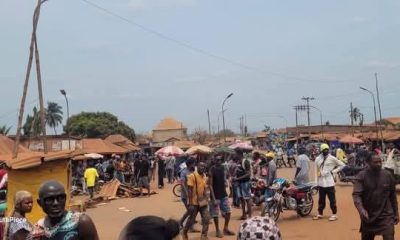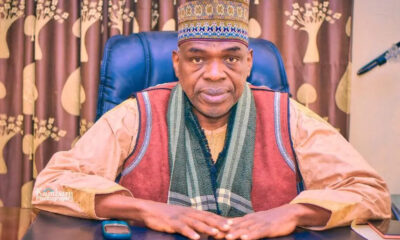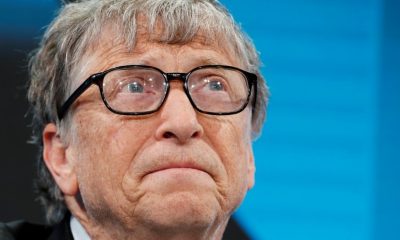News
Benue teachers groan over 13 months’ unpaid salaries

Teachers in Benue State say they are facing a lot of hardship due to the over 13 months of salaries owed them by the government.
Our correspondent reports that some of the public primary school teachers have taken to petty trading and farming after school hours to meet some of their household needs.
But, there are others who do nothing outside of their teaching job, other than wait, hopefully, for the state government’s many promises to offset the salary backlog to materialise.
One of the teachers, who declined to mention her name, said she was owed a backlog of 15 months’ salaries.
“Teachers are owed a lot of money by the state government. I’m owed 10 months for 2017, then I haven’t been paid my salary for December last year, which was paid to a select few.
“Also, I have not been paid for February and March this year, which were also paid to a select few, and then October, and November with the entire arrears for this year.
“Our union is still negotiating with the government over it and then the full implementation of promotion since we are not being paid according to our supposed grade levels.
READ ALSO:
- Delta doctor killed by cultists, not patient’s relatives – Police
- Nigerian Supreme Council for Islamic Affairs has raised the alarm over the killing of Muslims in the South East
- Native doctor slumps, dies in hotel during sex romp with pastor’s wife
“I can honestly say that coping with the situation has been tough. Personally, I have supportive siblings who reach out to me for food and cash, which keeps me going.
“I have suspended all forms of petty business that I was doing before due to the epileptic payment because when it’s finally paid, prospective customers give reasons why they can’t pay their debts, which is always very obvious.
“This is to avoid any tension and tied up resources. So I have stopped trading for now, till the economy improves,” she said.
Another teacher in the state who also for fear of victimization preferred anonymity, said he has found solace in farming to meet the feeding demands of his family.
The teacher claimed that the state government owed him over 13 months of unpaid salaries between 2017 and 2021.
“The government keeps alternating the payment of our salaries such that some would be paid while others would not. The hardship that accompanies unpaid salaries can only be better imagined,” he said.
Similarly, most of the affected teachers corroborated the tales of hardship that have driven many of them into petty trading and farming for survival.
Apart from teachers, some other workers in the state’s employment claimed that they were owed two to three months’ salaries.
Another teacher who gave her name as Agnes said: “Besides being owed over 15 months, the question of promotion is completely thrown out of the window.”
She said the government is not sincere about the plight of teachers in the state noting that they work under the most debilitating condition anywhere in the country.
READ ALSO:
- Peter Obi gets another major endorsement as Edwin Clark backs LP candidate
- Sharia Court dissolves three-month-old marriage, orders wife to return dowry
- Ronaldo’s Saudi Arabia era begins, with fans set for first look at star
Also speaking on the issue, the state chairman of the Nigerian Union of Teachers, Levi Terna Akuma, said they are currently negotiating with the state government to avert any impending strike action, which may be their last resort.
He said because of the hardship suffered by most teachers due of their unpaid salaries, the union recently asked them to stay at home for a short period but that they have since returned to work, stressing, however, that the move wasn’t a strike.
“What happened recently wasn’t a strike, but our teachers stayed at home because they didn’t have money to transport themselves to work.
“We, primary school teachers, were waiting for our August salaries; we were waiting at a time when every one of our counterparts under the same government was paid but we were not paid.
“So, teachers were saying that they don’t have money to go to work. We were in October at that time. Then, we asked the government to give us that money. The government paid up to 20 LGAs but we were waiting for three.
“In the end, the government paid the three LGAs so we came back to work.
“The backlog is 10 months in 2017, that’s between March and December of that year. And then December 2021; February and March 2022; and currently, September has been paid but not everybody has been paid.
“I don’t know precisely the amount being owed. But all together in 2017, the money was over N1.7 billion – that’s the 10 months. This time around, I didn’t do the summation, but it’s a huge amount of money,” he said.
Speaking on whether the union knew about any plans by the government to pay the backlog, Akuma said, “We gave a 14-day ultimatum, it passed; we gave seven-day, it passed too; and we are supposed to give a three days ultimatum of which if the government fails we can go on indefinite strike but the government called for negotiation on Wednesday.
So, until after the meeting, then I will know the intention of the government and what we want to do.”
Governor Samuel Ortom, while presenting the 2023 budget of N179 billion recently to the House of Assembly said, “The recurrent expenditure estimates focus on our obligation to faithfully pay the salaries of our workers and meet our obligations under our new Pension Laws and to our retired workers.”
Meanwhile, the State Universal Basic Education Board (SUBEB) chairman, Comrade Joseph Utse, has blamed the situation on the effect of COVID-19 and the dwindling allocation from the federal accrual.
He said, “The federal government could not give us enough funds for the payment of teachers, and since COVID-19 came and went, our allocation has been going down even from the federation account.
“The actual wage bill of the teachers in the state, as we have now given promotions to teachers, is N1.5 billion. As of now, we are up-to-date on the payment of salaries to teachers.
“It’s only the arrears that the present government inherited from the previous administration, and the governor is trying to settle that.”
Utse, however, faulted some of the teacher’s claims, stressing that at a political period such as this, some of them who belonged to other political parties may want to destroy the government by exaggerating what they were owed.
“Even if we owed them, plans are underway to make things right. Definitely, we are trying to pay all we owe before the administration winds up.
“The governor is so concerned with basic education; that is why he is doing everything possible to make sure these things are cleared.
“We have promoted teachers; we have paid them monies of the promotion after 17 years of not being promoted; and we are negotiating with the NUT and they have not even given us a headlight.
“The other one (strike) which they went was just for one week for only three local governments that we could not settle because of the low income from the federation account.
“I believe that if NUT is on the table with us, the teachers who go out on personal interest are unfair.
“On our part, we will try our best to see that no teachers go on strike,” the SUBEB chairman said.
Daily Trust
News
FG screens Fani-Kayode, Femi Pedro, others for ambassadorial posts, Reno Omokri missing
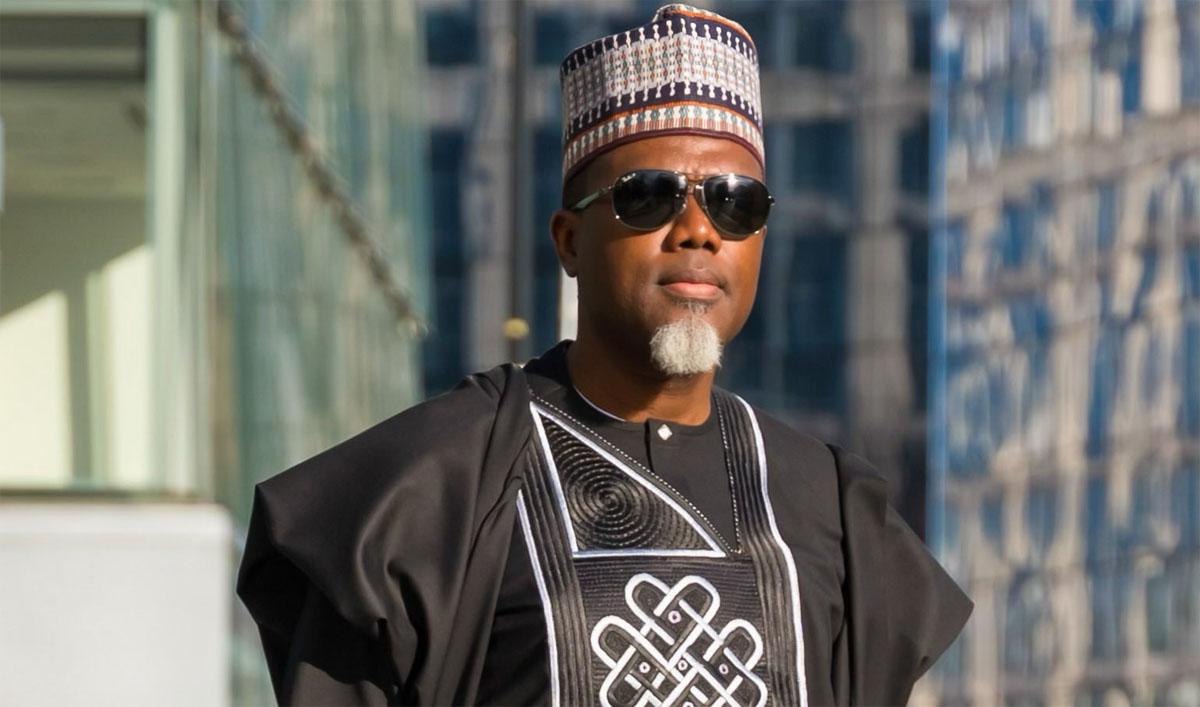
FG screens Fani-Kayode, Femi Pedro, others for ambassadorial posts, Reno Omokri missing
The Federal Government has begun vetting candidates for ambassadorial postings across its 109 diplomatic missions, including 76 embassies, 22 high commissions, and 11 consulates.
According to a report by Punch, credible sources revealed that former Aviation Minister Femi Fani-Kayode and former Lagos State Deputy Governor Femi Pedro are among the individuals undergoing screening.
The paper revealed that the process is being carried out through regional offices of the Department of State Services (DSS), rather than through a centralised mechanism.
Presidency officials confirmed that nominees have been contacted and asked to submit personal, educational, and professional records.
“They’re already doing security checks with DSS. When they have cleared security checks, we will release the list. Only those who have been cleared are announced. The process is ongoing. I know that we should have a list before the end of this month (April),” an official disclosed anonymously.
Another source stated, “The vetting is not done centrally. It is based on the location of the nominees. Nominees have been reached to provide personal history and information such as where they attended school, what appointments they have held, and the like. So, it is by location.”
READ ALSO:
- Israel admits mistakes over medic killings in Gaza
- I’m holier than you, Lizzy Anjorin tackles gospel artiste Tope Alabi
- Death of pregnant woman denied hospital care worries Lagos govt
Since September 2023, President Bola Tinubu has operated his foreign policy built on the “4Ds”—Democracy, Development, Demography, and Diaspora—without confirmed ambassadors in place. That same month, he recalled more than 83 ambassadors, both career and political.
In December, sources said the President spent part of his holiday reviewing nominees for diplomatic assignments with plans to send a consolidated list to the National Assembly. However, the process was delayed in January due to financial constraints.
One presidency insider said the delay was largely due to the estimated $1 billion required to settle outstanding obligations including the arrears of foreign service staff, renovations, and vehicle replacements.
“You see, the major issue is money. Not money to pay them [ambassadors], because how much is their salaries and benefits? The main money is CAPEX [Capital Expenditure]. By the time they put the cost together to fix the issues, it is running to almost $1bn.
“Most of those embassies, almost 90 per cent, are rundown. Either the residence is not good, the embassy does not have a functional office, or their rent has expired… I understand that some of them don’t have serviceable vehicles… Some of them don’t even have power and running water,” the source explained.
Foreign Affairs Minister Yusuf Tuggar has also blamed the delay on lack of adequate funding.
“It is a money problem,” Tuggar said during a May 2023 ministerial briefing in Abuja. “There is no point sending out ambassadors if you do not have the funds for them to even travel to their designated countries and to run the missions effectively… Mr President is working on it, and it will be done in due course.”
READ ALSO:
- Ancelotti laments after Valencia beat Real Madrid
- Jose Mourinho banned for three games, fined $7734
- Fuel prices to fall as global cost of oil falls
Although the 2025 budget includes provisions to address some of the issues, insiders say the funding is insufficient.
While the complete list of ambassadorial nominees remains classified, officials confirmed that several prominent figures are undergoing screening.
“They’re going to announce the appointments soon. They are being screened as we speak… FFK [Femi Fani-Kayode] is on the list. These are some of the controversial names that have been put forward as well. Then there is Fola Adeola [co-founder of Guaranty Trust Bank] and Femi Pedro too. They’re moving on with the process more quickly this time,” a source said.
According to another official, the rigorous screening is intended to ensure none of the candidates pose reputational or security risks to the country.
There were speculations that former presidential aide Reno Omokri had been shortlisted, but a source in the presidency dismissed the claim.
“Reno is not on the list. But FFK is there,” the source said.
Presidential adviser Bayo Onanuga confirmed that the list will include both career and political nominees and will undergo multiple layers of review before submission to the legislature.
“Don’t forget that the ambassadorial list has two components. There are career ambassadors and political ambassadors. The foreign affairs list and the consolidated list will still go through certain processes before they are released,” he said.
Two individuals believed to be among the nominees declined to comment when contacted. They neither confirmed nor denied their inclusion.
FG screens Fani-Kayode, Femi Pedro, others for ambassadorial posts, Reno Omokri missing
News
I didn’t collapse, says Wike, warns death rumour mongers
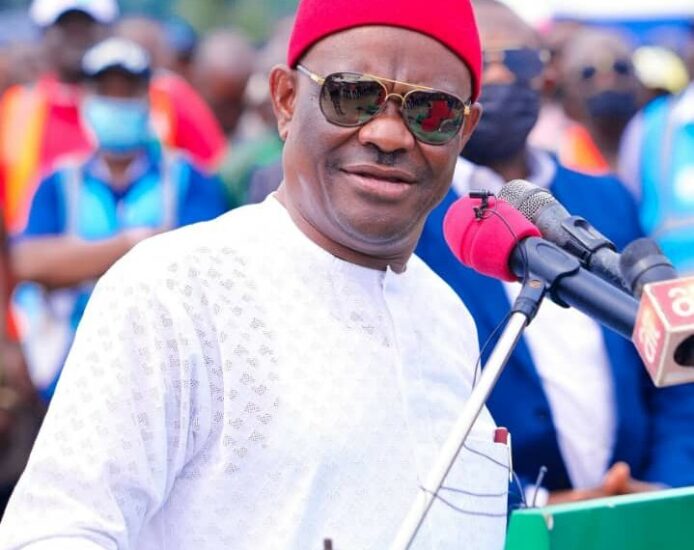
I didn’t collapse, says Wike, warns death rumour mongers
Minister of the Federal Capital Territory, Nyesom Wike, has debunked reports that he collapsed and was rushed to the hospital last week.
Wike described the reports of his rumoured collapse as the handiwork of “baseless” people trying to score cheap political points.
He spoke after inspecting four ongoing projects in the FCT, including the International Conference Centre.
Online posts circulating on X had surfaced alleging that the minister collapsed at an event on Friday in the FCT.
The rumour also claimed that Wike was immediately rushed to an undisclosed hospital, where he received treatment.
Reacting, Wike said, “There was no time I collapsed, there was no time anybody took me overseas. But you see me every day. The day Mr President broke iftar on his birthday, I was there.
“The next day, I led Abuja residents to pay Sallah homage. I see all those stories just died down. This is politics. We have thick skin. Those things don’t bother us. We are not distracted. We are focused on our jobs.
“So, I thank Nigerians for being worried, which should be, but people should not wish their fellow human beings such a thing to happen.
“We know that we will die one day. Nobody will remain in this world forever, but it is only God that says the day you will die, not any human being to say you will die today or you will die tomorrow.
“So, you have seen that I am even healthier than most of them who carried that rumour and I will write their condolence letters. I can assure you that I will write their condolence letters.”
News
World Bank approves Tinubu’s $632m loan request

World Bank approves Tinubu’s $632m loan request
The World Bank is poised to approve $632 million in new loans to Nigeria today (Monday), amid growing concerns over the country’s expanding debt profile.
The loans are intended to support important sectors such as nutrition enhancement and quality basic education.
According to data obtained from the World Bank’s website on Sunday, the two loans scheduled to be approved today are $80 million for the Accelerating Nutrition Results in Nigeria 2.0 initiative and $552 million for the HOPE for Quality Basic Education for All programme.
Both projects are now in the negotiating phase and are likely to gain final clearance later today.
These new loans are part of the World Bank’s overall strategy to support Nigeria’s development agenda, which focuses on healthcare, education, and community resilience.
The loans will support the government’s efforts to improve nutrition and education for Nigerian children.
Additionally, the World Bank approved a $500 million loan for Nigeria’s Community Action for Resilience and Economic Stimulus Programme on March 28, 2025, a significant step towards addressing the country’s economic challenges through expanded access.
The initiative, formally known as the NIGERIA: Community Action (for) Resilience and Economic Stimulus Programme, is intended to give critical support to households impacted by economic downturns while also strengthening community resilience.
The initiative focuses on vulnerable populations, providing assistance to households and small companies to help them cope with economic difficulties.
READ ALSO:
- Okada rider allegedly stabbed to death by wife over money
- Police rescue two persons abducted in Lagos
- Miyetti Allah accuses Benue community of poisoning 20 cows
The loan clearance is likely to considerably boost Nigeria’s efforts to revive the economy through grassroots backing, especially given current issues such as inflation and high living costs.
The stimulus plan will prioritise enhancing food security and developing economic possibilities for the populations most affected by recent economic changes.
This decision came after a delay in distributing funds for a previous loan aimed at poor and vulnerable Nigerians.
Further investigation by The PUNCH revealed that the World Bank disbursed around $315 million to Nigeria from the $800 million allocated for the National Social Safety-net Program Scale Up.
Nigeria is yet to receive further funding from the World Bank for this loan project, which was approved in December 2021. The delay in grant release is most likely due to fraud detected under the initiative.
In honour of the 2023 International Day for the Eradication of Poverty, President Bola Tinubu unveiled a social safety net programme that will distribute N25,000 to 15 million households over the course of three months.
The Federal Ministry of Humanitarian Affairs and Poverty Alleviation was responsible for managing the $800 million World Bank loan initiative.
However, due to allegations of embezzlement, the federal government was forced to stop the cash transfer program for further investigation and reform.
Betta Edu, a former humanitarian minister, was previously suspended for misappropriating N585 million set aside for palliative care distribution.
READ ALSO:
- Wike’s aide slams Atiku, says it’s too late to buy integrity
- Reps Committee recovers N21.4bn from four oil companies
- West African juntas impose levy on imported goods ECOWAS nations
Furthermore, Sadiya Umar-Farouq, Edu’s predecessor, was under investigation by the EFCC. The former minister is being investigated for allegedly laundering N37.1 billion during her stint as minister.
The World Bank also imposed sanctions on people and businesses discovered to be engaging in fraud under the initiatives.
According to the World Bank’s official website, this will bring Nigeria’s total approved loans to $9.25 billion over three years, indicating a growing reliance on multilateral funding to support critical sectors of the economy such as infrastructure, healthcare, education, and financial resilience.
A review of Nigeria’s World Bank loan approvals since 2023, under President Bola Tinubu’s government, reveals a huge rise in funding commitments.
In 2023, the World Bank approved $2.7 billion in loans for renewable energy, women’s empowerment, education, and the power sector. In 2024, funding approvals totalled $4.32 billion for various projects.
This increase was largely due to Nigeria’s growing need for financial assistance to stabilise the economy amid fiscal pressures and rising public debt.
Under President Bola Tinubu’s administration, the World Bank granted around 11 different credit projects for Nigeria.
In less than two years, the federal government has acquired loans from the World Bank totalling $7.45 billion, raising concerns about the mounting debt burden. According to data from the Debt Management Office, the World Bank’s portion of Nigeria’s external debt is $17.32 billion as of the third quarter of 2024.
The International Development Association is owing the majority of this debt, which amounts to $16.84 billion, or 39.14 per cent of Nigeria’s total external debt.
The International Bank for Reconstruction and Development, another World Bank subsidiary, is owing $485.08 million, or 1.13 per cent.
While the planned World Bank loans may give much-needed budgetary relief, concerns persist about the country’s mounting debt burden.
According to recent data from the Central Bank of Nigeria, the country has spent $5.47 billion servicing external debt in the last 14 months, underscoring the strain on its foreign reserves.
World Bank approves Tinubu’s $632m loan request
-
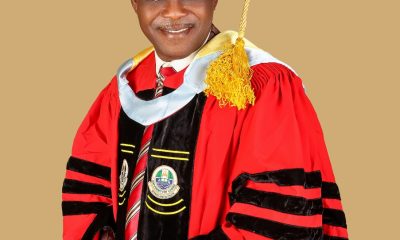
 Education23 hours ago
Education23 hours agoErudite mass comm lecturer Oscar Odiboh becomes full professor at Delta State University
-

 metro2 days ago
metro2 days agoAutopsy reveals cause of Nigerian boxer death during fight in Ghana
-

 Entertainment2 days ago
Entertainment2 days agoA colleague raped me, Actress Lolo 1 alleges
-

 metro2 days ago
metro2 days agoScavenger killed, many injured as military grenade explodes in Lagos
-

 Sports2 days ago
Sports2 days agoWife of Manchester United goalkeeper, Onana, robbed of £62,000 handbag, Rolex
-
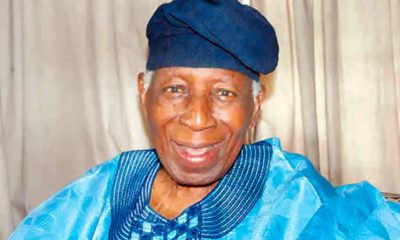
 metro1 day ago
metro1 day agoBreaking: Former Oyo governor Olunloyo dies at 89
-

 International2 days ago
International2 days agoTrump: VOA goes off air in Nigeria, Ghana, others
-

 metro20 hours ago
metro20 hours agoNurse leaves US, seeks new life in Nigeria, says everything not money

